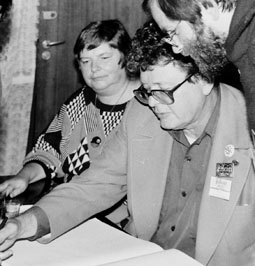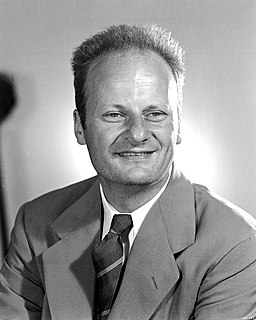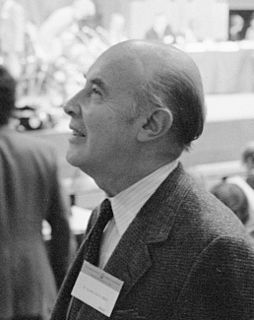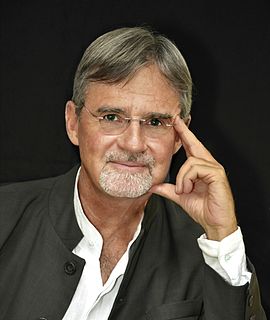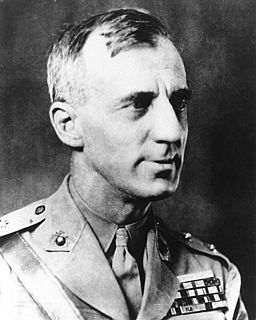Top 161 Disarmament Quotes & Sayings - Page 3
Explore popular Disarmament quotes.
Last updated on April 20, 2025.
When are we left-wingers going to learn that we are losing the cultural and political battle with conservatives because we are fractured into narcissistic special-interest groups? Why should an antiwar protestor be so concerned about her dietary identity? The political opinions of vegetarians and meat-eaters are, after all, equally important. And what does it tell us about vegetarians that it would never occur to meat-eaters to carry a sign that reads "Pacifist Pork Chop Lover for Peace" or "Backyard Rib Barbecuer for International Nuclear Disarmament"?
The court was unable to rule on all circumstances in which nuclear weapons might be used, and it said in view of the problems, the risks posed by nuclear weapons, and in view of the lack of certainty of the law in all circumstances, the best course is fulfilling the obligation of good faith negotiations of nuclear disarmament contained in the nuclear non-proliferation treaty.
A program of "disarmament," while imperialist antagonisms survive, is the most pernicious of fictions. Even if it were realized by way of general agreement - an obviously fantastic assumption!- that would by no means prevent a new war. The imperialists do not make war because there are armaments; on the contrary, they forge arms when they need to fight.
Ecology movements, futurism, feminism, urbanism, protest and disarmament, personal individuation cannot alone save the world from the catastrophe inherent in our very idea of the world. They require a cosmological vision that saves the phenomenon 'world' itself, a move in soul that goes beyond measures of expediency to the archetypal source of our world's continuing peril: the fateful neglect, the repression, of the anima mundi.
Colonization means potential immortality for the human genus. Man's safety on Earth was never great, and it dwindles hourly. Disarmament, even world government, will not guarantee survival in an age when population presses natural resources to the limit and when the knowledge of how to work mischief on a planetary scale is ever more widely diffused among peoples who may grow ever more desperate.
We have a crisis in nuclear weapons, and again, thanks very much to the Democrats: Bill Clinton, who removed us from the Anti-Ballistic Missile Treaty framework for nuclear disarmament, and then Barack Obama, who created a trillion-dollar budget for us to spend on a new generation of nuclear weapons and modes of delivery.
Anger and hatred cannot bring harmony. The noble task of arms control and disarmament cannot be accomplished by confrontation and condemnation. Hostile attitudes only serve to heat up the situation, whereas a true sense of respect gradually cools down what otherwise could become explosive. We must recognize the frequent contradictions between short-term benefit and long-term harm.
UN peacekeeping operations are now increasingly complex and multi-dimensional, going beyond monitoring a ceasefire to actually bringing failed States back to life, often after decades of conflict. The blue helmets and their civilian colleagues work together to organize elections, enact police and judicial reform, promote and protect human rights, conduct mine-clearance, advance gender equality, achieve the voluntary disarmament of former combatants, and support the return of refugees and displaced people to their homes.
Neurotic identity crises come when our defense mechanisms have been too successful and we're encapsulated in the fortress we have constructed with nothing to refresh us in our solitary confinement. So we play the old movies with their stale fears and their unrealistic hopes until we become bored enough to risk disarmament and engagement.
Today we are rightly in an era of disarmament and dismantlement of nuclear weapons. But in some countries nuclear weapons development still continues. Whether and when the various Nations of the World can agree to stop this is uncertain. But individual scientists can still influence this process by withholding their skills.
The chief reason warfare is still with us is neither a secret death-wish of the human species, nor an irrepressible instinct of aggression, nor, finally and more plausibly, the serious economic and social dangers inherent in disarmament, but the simple fact that no substitute for this final arbiter in international affairs has yet appeared on the political scene.
Anyone who thinks we can continue to have world wars but make them nice polite affairs by outlawing this weapon or that should meditate upon the outlawing of the cross-bow by Papal authority. Setting up the machinery for international law and order must surely precede disarmament. The Wild West did not abandon its shooting irons till after sheriffs and courts were established.
America is a large country and its people have so far not shown much interest in great international problems, among which the problem of disarmament occupies first place today. This must be changed, if only in America's own interest. The last war has shown that there are no longer any barriers between the continents and that the destinies of all countries are closely interwoven. The people of this country must realize that they have a great responsibility in the sphere of international politics. The part of passive spectator is unworthy of this country and is bound in the end to lead to disaster all round.
In a nuclear war there would be no victors, only victims. The truth of peace require that all-whether those governments which openly or secretly possess nuclear arms, or those planning to acquire them- agree to change their course by clear and firm decision and strive for a progressive and concerted nuclear disarmament. The resources which would be saved could then be employed in projects of development capable of benefiting all their people, especially the poor.
As long as nuclear weapons exist, there is a risk that they will be used. And the consequences of their use would be catastrophic. This realization has led to increased engagement, not least through the humanitarian initiative. We must now use this broad engagement to garner support and to push for real results in the disarmament field.
Negotiations with Iran, especially, will not be easy under any circumstances, but I suspect that they might be somewhat less difficult if the nuclear-weapon states could show that their requests are part of a broader effort to lead the world, including themselves, toward nuclear disarmament. Preventing further proliferation is essential, but it is not a recipe for success to preach to the rest of the world to stay away from the very weapons that nuclear states claim are indispensable to their own security.
...convince all nuclear powers, including those which have been more reluctant up to now, of the necessity to respect the "vital interests" of all peoples and to become fully aware of the profound truth of the following conclusion which the United Nations approved by unanimity four years ago: "Mankind is confronted with a choice: we must halt the arms race and proceed to disarmament or face annihilation".
Spiritually, compulsory disarmament has made us unmanly, and the presence of an alien army of occupation, employed with deadly effect to crush in us the spirit of resistance, has made us think we cannot look after ourselves or put up a defense against foreign aggression, or even defend our homes and families.
While we were never able to provide 100 percent certainty regarding the disposition of Iraq's proscribed weaponry, we did ascertain a 90-95 percent level of verified disarmament. This figure takes into account the destruction or dismantling of every major factory associated with prohibited weapons manufacture, all significant items of production equipment, and the majority of the weapons and agent produced by Iraq.
In less than a century we experienced great movement. The youth movement! The labor movement! The civil rights movement! The peace movement! The solidarity movement! The women's movement! The disability movement! The disarmament movement! The gay rights movement! The environmental movement! Movement! Transformation! Is there any reason to believe we are done?
If any influential nation had the great spiritual strength to lay down its arms and appear with clean hands before the world, the world would be changed. I see no evidence that any influential nations has such great spiritual strength and courage. Therefore disarmament will be a slow process, motivated by the wish to survive.
The use of a mere dozen nuclear weapons ... would be a human catastrophe without parallel. ... Because so few weapons can kill so many people, even far-reaching disarmament proposals would leave us implicated in plans for unprecedented slaughter of innocent people. The sole measure that can free us from this burden is abolition.
On healthcare, climate change, nuclear disarmament, gun control and countless other issues, President Obama consistently made difficult choices and put the national interest over his own political interest to do what was right. All the while, he resisted the politics of cynicism in a system that too often encourages it.
Most Americans have no memory of the designs Franklin Roosevelt's New Dealers had for postwar-American foreign policy. Human rights, self-determination and an end to European colonization in the developing world, nuclear disarmament, international law, the World Court, the United Nations - these were all ideas of the progressive left.
Indeed, often because of the size and weight in the world of our neighbor, we in Canada often define ourselves in contrast to American positions on things like Cuba, the Vietnam War and nuclear disarmament. Historically, Canada has not always been aligned with the United States. It doesn't necessarily serve anyone's interests - Canadian or American - to be seen as an extension of the United States.
The twentieth century had dispensed with the formal declaration of war and introduced the fifth column, sabotage, cold war, and war by proxy, but that was only the begining. Summit meetings for disarmament pursued mutual understanding and a balance of power but were also held to learn the strengths and weaknesses of the enemy. The world of the war-or-peace alternative became a world in which war was peace and peace war.
In a world where millions of human beings live in extreme poverty, die of malnutrition and lack medical care, where pandemics continue to kill, it is imperative to pursue good faith disarmament negotiations and to shift budgets away from weapons production, war-mongering, surveillance of private persons and devote available resources to address global challenges including humanitarian relief, environmental protection, climate change mitigation and adaptation, prevention of pandemics, and the development of a green economy.
The United States says "We're complying. We're following the disarmament obligation. Look at the quantitative reductions that are taking place." But, since '96, there really hasn't been progress on specific commitments that have been made. Perhaps most disturbing is this: that the United States and France in particular, since 1996, have expanded the range of circumstances under which they might use - they say they might use - nuclear weapons.
One of the most serious [challenges] is increased military spending and the cost of maintaining and developing nuclear arsenals. Enormous resources are being consumed for these purposes, when they could be spent on the development of peoples, especially those who are poorest. For this reason I firmly hope that, during the Nuclear Non-Proliferation Treaty Review Conference to be held this May in New York, concrete decisions will be made towards progressive disarmament, with a view to freeing our planet from nuclear arms
With the persistence of tensions and conflicts in various parts of the world, the international community must never forget what happened at Hiroshima and Nagasaki, as a warning and in incentive to develop truly effective and peaceful means of settling tensions and disputes. Fifty years after the Second World War, the leaders of nations cannot become complacent but rather should renew their commitment to disarmament and to the banishment of all nuclear weapons.
I made a movie to explain to the American public what had been achieved in regards to disarmament of Iraq and why inspectors aren't in Iraq today and detailing the very complex, murky history of interaction between Iraq, the United Nations and the United States. It is most definitely not a pro-Iraq movie. It is a pro-truth movie.
An institution that...would permit Iraq, a terrorist state that refuses to disarm, to become soon the chair of the United Nations Commission on Disarmament, and which recently elected Libya - a terrorist state - to chair the United Nations Commission on Human Rights of all things, seems not to be even struggling to regain credibility. That these acts of irresponsibility could happen now, at this moment in history, is breathtaking.
We have been led to believe that we have come a long way toward world nuclear disarmament. But that is not the case. Our government is not doing all that it could. We must urge our leaders to fulfill the obligations of the Nuclear Non-Proliferation Treaty. The United States must assume world leadership to end once and for all the threat of nuclear war. It is our moral responsibility.
Many people today agree that we need to reduce violence in our society. If we are truly serious about this, we must deal with the roots of violence, particularly those that exist within each of us. We need to embrace 'inner disarmament,' reducing our own emotions of suspicion, hatred and hostility toward our brothers and sisters
The antidote to hatred in the heart, the source of violence, is tolerance. Tolerance is an important virtue of bodhisattvas [enlightened heroes and heroines] - it enables you to refrain from reacting angrily to the harm inflicted on you by others. You could call this practice "inner disarmament," in that a well-developed tolerance makes you free from the compulsion to counterattack. For the same reason, we also call tolerance the "best armor," since it protects you from being conquered by hatred itself.
A bully has no respect for a weakling and the way to stop a bully is not to be weak. The way to stop a bully from ever being a bully is to say: "I'm as strong as you. Anything you do to me, I can do to you." We are going for nuclear and conventional disarmament but we're going about it in the right way.
For the United States to recommit itself to the obligation that we undertook in the Nuclear Non-Proliferation Treaty that many other states undertook, which was to work towards disarmament and the eventual elimination of nuclear weapons, is something that manifestly serves our national security interests.
The costs of an ignorance of science are nor just practical ones like misbegotten policies, forgone cures, and a unilateral disarmament in national competitiveness. There is a moral cost as well. It is an astonishing fact about our species that we understand so much about the history of the universe. the forces that make it tick, the stuff it's made of; the origin of living things, and the machinery of life. A failure to nurture this knowledge shows a philistine indifference to the magnificent achievements humanity is capable of; like allowing a great work of art to molder in a warehouse.
Any politico who's afraid of his constituents being armed, should be. Leaders of the anti-gun movement (for the most part, politicians who enthusiastically advocate confiscatory taxation and government control of everything) realize that a populace is much easier to herd, loot and dispose of if it has been stripped of its weapons. The naked fraud and transparent fascism of victim disarmament must be eradicated through the repeal of all gun laws at every level of government.
War is a racket. It always has been... A few profit - and the many pay. But there is a way to stop it. You can't end it by disarmament conferences. You can't eliminate it by peace parleys at Geneva. Well-meaning but impractical groups can't wipe it out by resolutions. It can be smashed effectively only by taking the profit out of war.
There is no sign, not one sign, that the Iraqi regime has any intent to comply fully with the terms of Resolution 1441, just as it has failed to comply with previous U.N. Security Council resolutions. The international community gave Iraq one final opportunity to disarm peacefully, and that opportunity has run its course. Dr. Blix [Chief U.N. Weapons Inspector] told us on Monday that there has been no progress toward credible, verifiable disarmament.




